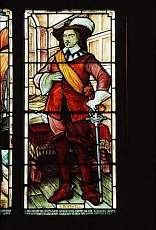Oliver's Army

Oliver Cromwell - A great revolutionary of his time
When Gandhi visited Britain during the 1930s, he was told by some patronising and pompous Professor of Colonial History at Oxford that the Indian nationalist movement would win in the end if it worked peacefully for democracy and independence from the British Empire. Gandhi replied by asking the professor whether that was how either Britain or America had succeeded in winning their democracy.
The 3rd of September 2008 marked the 350th anniversary of the death of Oliver Cromwell, the leader of the great democratic bourgeois revolution which took place in England during the 1640s. John Rees describes his life here, which serves to also remind us that democracy was not bestowed on Britain by an enlightened British ruling class nor was it the product of a foreign army waging some imperialist 'civilising mission'. Rather it came from below, through class struggle. As Rees notes,
Cromwell was the decisive figure of the English Revolution of the 1640s. He came from that part of society that was to be the engine of the revolution. He was a distant descendent of Thomas Cromwell, Henry VIII’s "hammer of the monks". His family benefited from the sale of church lands at the dissolution of the monasteries between 1536 and 1540.
This development weakened the lords’ dependence on the monarch and created a new layer of landowners more likely to relate to commercial interests than to respond to old feudal loyalties. Cromwell himself noted that he was "by birth a gentleman, living neither in any considerable height, nor yet in obscurity". In the 1630s, he was, as historian John Morrill points out, "a yeoman, a working farmer. He had moved down from the gentry to the ‘middling sort’."
This new "middling sort" were more than economically opposed to the old feudal restrictions and Charles I’s taxes on new wealth. They were also ideologically opposed to the semi-Catholic forms of church hierarchy and idolatry. For them these undermined the Puritan reformation that had begun when Henry VIII broke with the Catholic church.
I once visited Cromwell's house at Ely (see picture below):

It was here that Cromwell lived for ten years after 1636, during what might be called the heroic phase of his career where he built up his New Model Army of legend. It is not a particularly big or grand house, indeed quite in keeping with a revolutionary hero opposed to privilege during the seventeenth century.
As the Civil War polarised opinion, Cromwell’s determination triumphed. His regiment, the Ironsides of the Eastern Association, was the most effective force in the army. It became the model for the whole army when it was reorganised, or "new modelled", in 1644, following the failure of the parliamentary forces to make a major breakthrough.
Cromwell pushed out the old leaders by insisting that parliament pass the "self denying ordinance" banning MPs and lords from holding command in this New Model Army – with one exception, Cromwell himself. But the real strength of both the Eastern Association and the New Model Army was that they mobilised the energy of the lower classes and did not simply rely on the gentry, the traditional ruling class of the counties.
When Cromwell was criticised for appointing a captain of horse who was not from the gentry he replied, "I had rather have a plain russet-coated captain that knows what he fights for and loves what he knows, than that which you call a gentleman and is nothing else." Cromwell’s policy, and the radical Puritan ideology that imparted discipline to these recruits from the "middling sort", transformed the military situation. This force annihilated the Royalists at the battles of Marston Moor and Naseby in 1644 and 1645.
The New Model Army proved in practice to be an ideal form of revolutionary organisation for waging class war successfully. That is why the founder of the Red Army during the Russian Revolution Leon Trotsky always paid his respects to Cromwell, who he wrote was 'a great revolutionary of his time, who knew how to uphold the interests of the new, bourgeois social system against the old aristocratic one without holding back at anything'.
Today, in Britain and internationally socialists need to take inspiration from the revolutionary history of the past in order to build up a 'New' New Model Army in the present. We can learn from Cromwell that for the new ideas to triumph over the old in a revolutionary struggle one needs to build an organisation with the ideas, determination and discipline to provide revolutionary leadership. Only then can we win the victory of democracy against imperialism, and win a new world without classes, war, and violence.
Labels: Britishness, history, socialism




0 Comments:
Post a Comment
<< Home